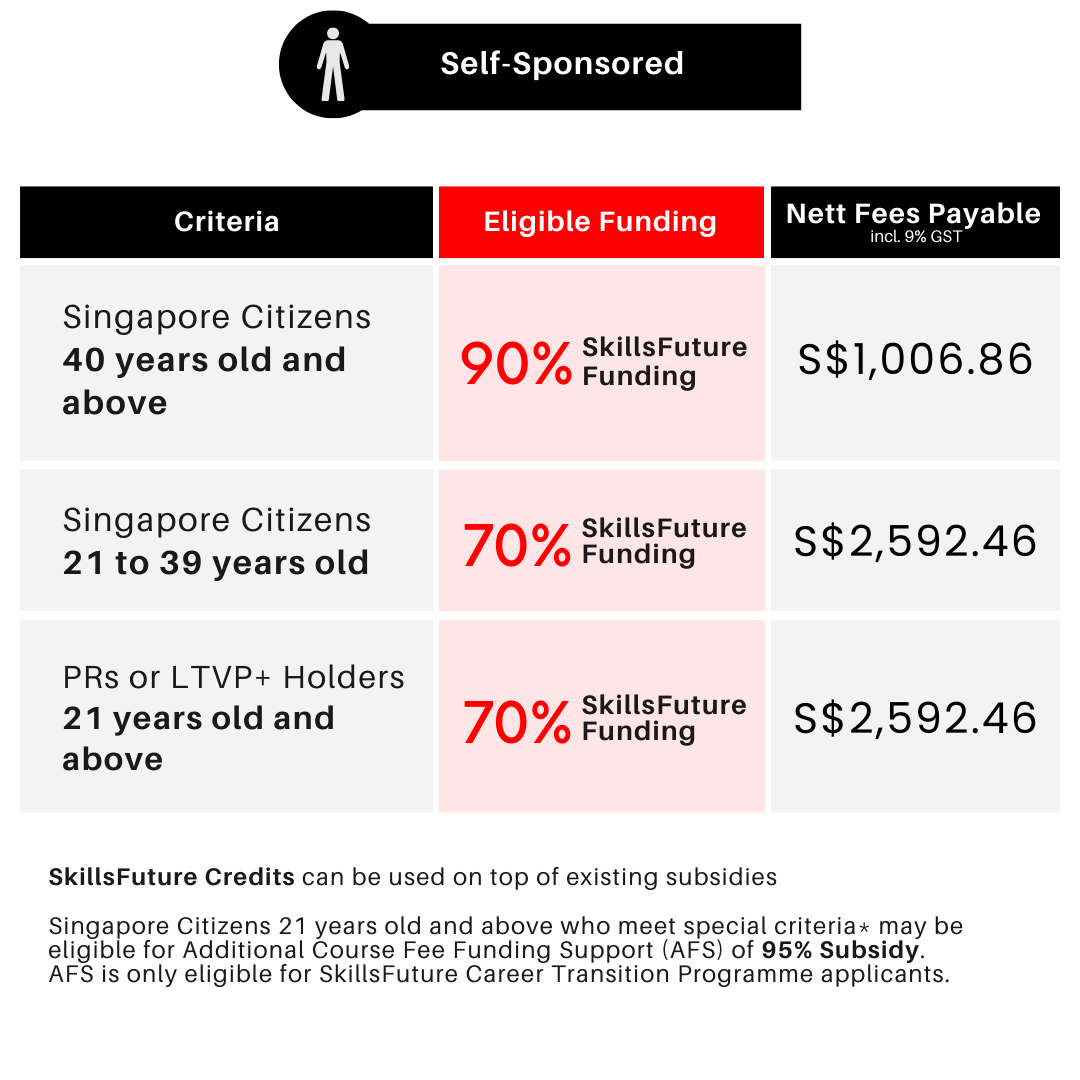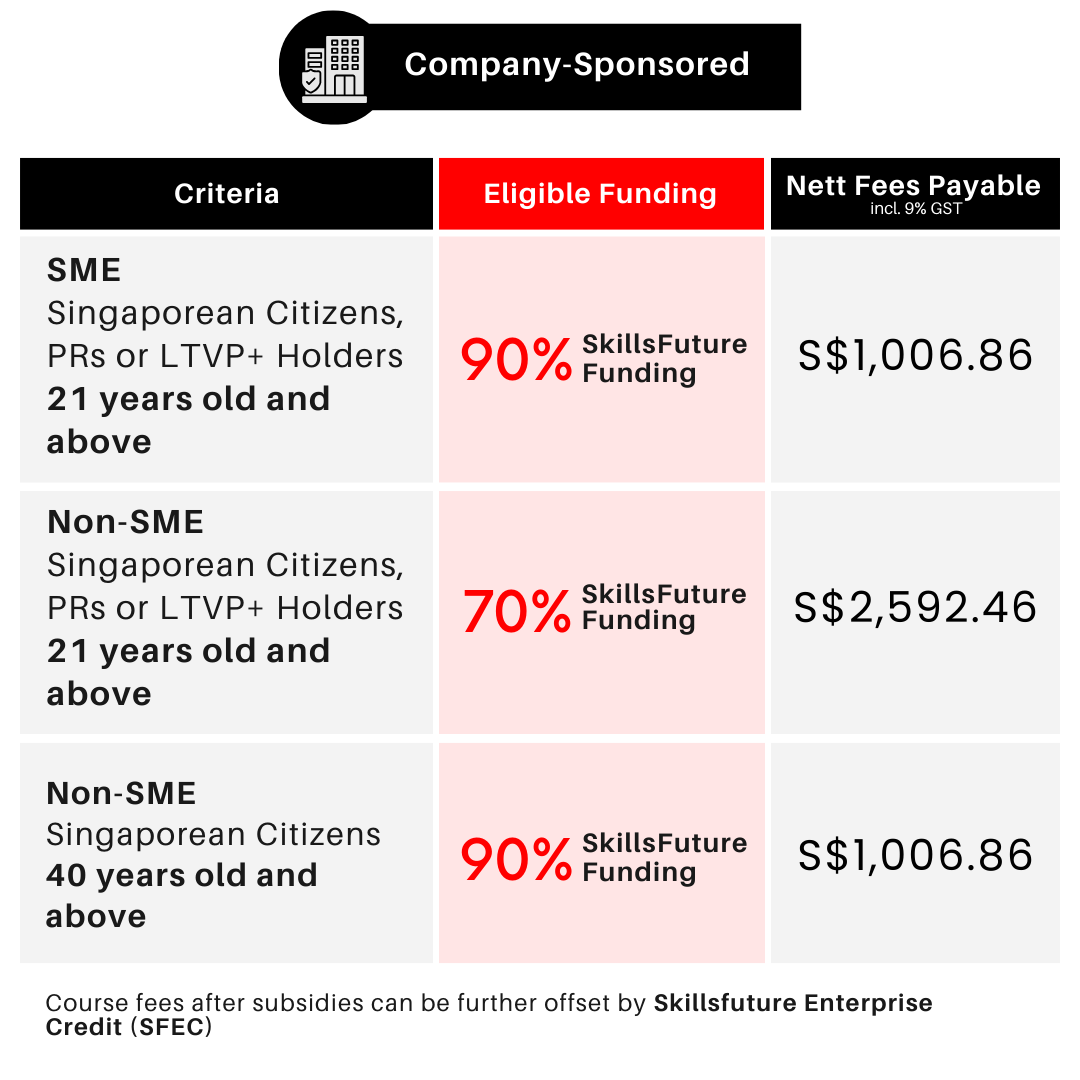Enhance your digital marketing skills and embark on a journey toward becoming a proficient digital marketer. Our comprehensive Diploma in Digital Marketing is designed to provide you with the in-depth knowledge and practical skills necessary to excel in today’s fast-paced digital landscape.
The diploma programme comprises seven highly focused modules starting with the WordPress Website Creation Course where you will master the art of creating modern, secure websites using WordPress. Next, you get to unleash your creativity and create digital content, including visuals, graphics, videos, and more in the Digital Content Creation Course. After which, you’ll take on the Copywriting & Content Writing Course where you will learn the power of persuasive writing and the art of creating impactful content and copy.
Moving on from that, you’ll learn the digital advertising aspects which consists of the Google Ads Course and the Facebook and Instagram Marketing Course where you’ll set up campaigns from start to optimisation on the respective platforms. Finally, you’ll go through the Website and Landing Page Conversion Optimisation Course where you’ll be equipped with the skills and know-how to optimise marketing funnels and landing pages to increase conversion rates.
At the end of the course, you’ll create a digital marketing campaign from start to finish through a Capstone Project.
Upon completion of our Diploma in Digital Marketing, you’ll not only possess a deep understanding of the digital marketing landscape but also have hands-on experience to showcase your expertise. Whether you’re launching a new career or seeking to advance your current one, our diploma program empowers you to succeed in the ever-evolving world of digital marketing.
Enrolment Requirement:
To apply for the WSQ Diploma in Infocomm Technology (Sales and Marketing) Programme, you should possess one of the following qualifications or meet one of these criteria:
Basic computer literacy and an advanced understanding of sales and marketing concepts are required.
All Applicants will go through pre-enrolment screening process.
Application Documents Required:
These documents will be reviewed as part of the screening process.
Assessment Method:
Written assessment (i.e., Short Questions & Answers & Case study) & Individual Project Assignment.
 Industry-recognised WSQ Statement of Attainments
Industry-recognised WSQ Statement of Attainments
 Comprehensive, up-to-date curriculum and courseware
Comprehensive, up-to-date curriculum and courseware
 Real-world hands-on projects
Real-world hands-on projects
 Career advisory and resources support
Career advisory and resources support
Build a solid foundation in creating, designing and maintaining a website using WordPress. This hands-on module guides you through the process of designing, customising, and launching professional-looking landing pages to engage your audience and achieve your business goals. Dive into website creation and web design best practices.
At the end of the module, the trainees should be able to demonstrate proficiency in creating WordPress website design blueprint and customisation, including defining the project’s scope and user needs, selecting and applying design standards and tools, customising a theme, integrating digital marketing functionalities, and producing comprehensive design documentation that outlines the project’s design concept, specifications, and structure, ensuring a cohesive approach to website development and digital marketing strategy.
Learn to transform your creative concepts into compelling digital content that resonates with your audiences. This module covers various forms of digital content from graphics to animations for your platform. Go further into SEO and promotion through social media and email marketing, ensuring your content reaches your audience.
At the end of the module, the trainees should be able to develop and execute a digital content strategy that includes analysis, planning, and execution phases. The strategy should focus on content creation, SEO optimisation, and promotion across social media and email marketing to effectively engage a targeted audience.
● Transform an overall content management strategy into policies on web content creation and curation, breaking down the strategy into specific guidelines and rules that govern how content is created, curated, and managed on the web.
● Develop a web content strategy for an organisation, including defining target audiences, setting clear goals, planning content creation, and evaluating content management system options, considering cost, scalability, user-friendliness, and integration capabilities.
● Create and optimise various forms of digital content, including written, multimedia, and interactive content, adhering to best practices for search engine optimisation (SEO), user experience (UX) design, and accessibility to enhance the visibility, engagement, and effectiveness of web content for their target audience.
● Assess emerging tools and techniques, including applying them to enhance user engagement and adapt to evolving user behaviours in their content creation and management efforts.
Acquire the writing skills to craft compelling copy and content resonates with your audience while achieving your marketing objectives. Takeaway essential techniques such as creating digital storyboards, incorporating SEO in your copywriting and more, to ensure your content and writing will be impactful and inspire action.
1. Contents – The Foundation to Digital Marketing
2. Principles of Digital Storytelling
3. Evolving Preference in Contents
4. Conceptualising Content Ideas
5. Identifying Content Requirements
6. The Digital Storyboard Process
7. Parameters of Delivering Content
8. Features of Marketing Content
9. Modes of Content Delivery
10. Mapping Digital Storyboard
11. Frequency of Delivering Content
12. Determine Content Types and Styles
13. Modes and Processes for Distributing Contents
14. Guidelines for Content Strategy Execution
15. Concept of copywriting and content writing in digital marketing
16. SEO in Copywriting and Content Writing
17. The Role of Content in SEO
18. Ethical Considerations and Copywriting Law
At the end of the module, the trainees should be able to demonstrate their ability to choose products or campaigns that meet digital marketing goals, craft diverse marketing content for a defined audience, design digital storyboards for strategic planning, set content delivery schedules and formats to boost engagement, select appropriate distribution channels, and create guidelines to ensure brand consistency, content quality, performance tracking, and effective team collaboration.
Apply the principles of digital storytelling to conceptualise and create content ideas that effectively meet marketing objectives, engaging audiences and driving desired actions in the online landscape.
Create a digital storyboard as an integral component of a content strategy plan, including applying multichannel content strategies that adhere to the parameters of delivering content for marketing purposes, incorporate the essential features of marketing content, and employ various modes of content delivery to achieve marketing objectives.
Gain hands-on training in Google Ads, Search Engine Marketing (SEM), and Display Advertising (PPC). This module offers step-by-step experience in setting up campaigns, choosing the right keywords, and optimising for the best performance to maximise your ROI.
1. Introduction to Google ads and Strategic Planning
2. Google Ads Campaign Setup
3. Measuring a Google Ads Campaign
4. Testing & Optimisation
At the end of the module, the trainees should be able to demonstrate their ability to plan, execute, measure, and optimise a hypothetical Google Ads campaign, including selecting objectives, ad types, targeting, budgeting, creating ads, analysing performance metrics, and conducting experiments to improve the Quality Score.
Understand marketing on two of the world’s largest social platforms Facebook and Instagram. This module teaches you to strategise, create, and execute effective advertising campaigns on Facebook and Instagram, targeting specific demographics for greater engagement.Dive into real-world case studies and gain insights to leverage these platforms for your business.
Learning Units:
1. Meta (Facebook and Instagram) Marketing
2. Meta Marketing Plan and Ads Campaign
3. Launch and Evaluate Meta Ads Campaign
4. Crisis Communication Plan
At the end of the module, the trainees should be able to demonstrate their ability to plan, create, launch, and evaluate a Meta ad campaign, encompassing setting objectives and target audience, developing and uploading ad creatives, initiating the campaign, and measuring its success through key performance indicators to make data-driven optimisations.
Dive into step-by-step data-driven methods on how to optimise your website and landing pages to convert visitors into leads and customers. Learn hands-on how to analyse user behaviour, A/B test different elements, CRO tools, and make data-driven decisions to improve conversion rate while achieving business goals.
1. Introduction to Conversion Optimisation
2. Consumer Psychology and the User Experience
3. Fundamentals of Design (UX/UI)
4. Effective Content & Messaging
5. Optimisation Tools
6. Measurement and Reporting
At the end of the module, the trainees should be able to demonstrate their ability to optimise website and landing page conversions through assessment, design improvements, content enhancement, technical optimisation, and performance monitoring across five stages, involving SWOT analysis, wireframing, content strategy development, A/B testing, SEO adjustments, and tracking key performance indicators in Google Analytics for ongoing refinement and performance improvement.
The Capstone Project involves crafting a comprehensive Digital Marketing Campaign portfolio for a partner enterprise, detailing a conversion-optimised landing page design, engaging content for both web and social platforms, targeted ad copy for search and display, and meticulously set up Google Ads and social media campaigns. This includes conducting a SWOT analysis of competitor pages, creating compelling digital content, and evaluating the overall campaign effectiveness using conversion optimisation models, with a focus on aligning the campaign’s purpose, objectives, and execution with the partner enterprise’s specific requirements and goals.
Best learning provider with great trainers as i have attended the SCTP Diploma in Infocomm Technology (Digital Marketing Diploma) and now I’m finishing the capstone project. The preferred training provider to go to if you intend to upgrade your marketing skills, it is centrally located and they have friendly trainers and nice management staffs including the boss Mr Anson.
My trainer, Raymond Teoh, is very experienced and nice, and the rest of the staff here are also very nice. I liked this so much until I decided to sign up for the Diploma in Digital Marketing. I attended the career fair on the 29th June at International Plaza and became even more convinced that digital marketing could be the turning point in my mid-life career journey.
I found that the trainers here are all kind and direct in delivering the course, making it interesting and I feel more comfortable to continue through to the end of the Diploma programme. As for ASK’s training centre, it is comfortable place for us to learn and the e-learning platform is also easy to operate. 😁👍




The WSQ Diploma in Digital Marketing is a comprehensive programme designed to equip individuals with job-ready practical skills and knowledge to excel in the dynamic field of digital marketing. This Diploma programme covers everything you need to know from building a website to running advertising campaigns on Facebook and Google.
The WSQ Diploma in Digital Marketing is recognised by SkillsFuture Singapore (SSG) and is part of the SkillsFuture Career Transition Programme which offers practical, industry-relevant training that enables participants to apply their learning directly to real-world scenarios. Participants of this programme will also receive career advisory and resources support upon graduation.
The WSQ Diploma in Digital Marketing is ideal for:
🔴 Marketing professionals looking to upgrade their digital marketing skills and stay competitive.
🔴 Entrepreneurs seeking to enhance their online presence and effectively market their products or services.
🔴 Career changers interested in transitioning into the dynamic field of digital marketing.
🔴 Mid-career professionals seeking to upskill or reskill for better job opportunities in the digital marketing sector.
🔴 Anyone keen to learn about the latest digital marketing trends, tools, and strategies.
The curriculum of the WSQ Diploma in Digital Marketing covers a wide range of topics, including but not limited to website creation, social media marketing, content creation, website and landing page optimisation, copywriting, and digital advertising such as Google Ads.
For more information on the course modules and curriculum, click on the modules tab.
The duration of the WSQ Diploma in Digital Marketing may vary depending on the mode of study and individual learning pace. Typically, it can be completed over 4 months.
The Capstone Project allows you to apply all the knowledge and skills gained throughout the programme to create a digital marketing campaign from scratch. This hands-on experience will showcase your expertise and readiness to excel in the digital marketing field.
Upon completion of the programme, you will possess a deep understanding of the digital marketing landscape and have hands-on experience to showcase your expertise, making you highly competitive in the ever-evolving world of digital marketing in Singapore.
Graduates of the WSQ Diploma in Digital Marketing can explore various career opportunities in Singapore with roles such as digital marketing specialist, social media manager, SEO analyst, content strategist, and digital advertising executive, among others.
Yes, we offer career support services to our course graduates, including career advisory and resources support. For more information, head over to our Career Services page.
You may sign up at our registration page here to fill up the form with your details and submit the course registration form. Upon submitting the registration form and making payment, your seat will be reserved and we will contact you for confirmation.
If you encounter any difficulties during the registration process or have any questions, you can contact us and our programme consultants will be happy to assist!
The SkillsFuture Career Transition Programme (SCTP) supports mid-career individuals in acquiring industry-relevant skills to improve employability and pivot to new sectors or job roles.
You can choose to study part-time or full-time, depending on what suits you best, and the programme lasts between 3 to 12 months.
This ensures individuals like you have the opportunity to upskill or re-skill while effectively preparing for successful career transitions.
For more information on SkillsFuture Career Transition Programmes (SCTP), visit the MySkillsFuture website.
Eligible participants can get up to 95% SkillsFuture Singapore funding for our Diploma programme. We also have various funding options available on top of the fee subsidy.
To know more details on the course fees and subsidies available, head to the Course Fees and Subsidies section above, check out our Funding Information page or contact our course consultant for further assistance.
| (SCTP) WSQ Diploma in InfoComm Technology (Sales & Marketing) | |
|---|---|
| Fee Excluding GST | $7,928.00 |
| For Singaporeans > 21 (Excl. GST) | $2,378.40 |
| For Singaporeans > 40 (Excl. GST) | $792.80 |
| For Foreigners (Excl. GST) | $7,928.00 |

Graduate with a recognised certificate

Experience real-world application through hands-on projects with real project partners

Learning materials are vetted by our Dean to ensure relevant and up-to-date curriculum

Gain one-on-one coaching by our mentors when completing your capstone project

Personalised career advise and support to assist in your job search

Trainers are hand-picked industry experts who are certified trainers, offering real-world insights


Bachelor's of Computing in Information System National University of Singapore


Bachelor's of Computing in Information System National University of Singapore


Bachelor's of Computing in Information System National University of Singapore


Bachelor's of Computing in Information System National University of Singapore

If you’re thinking about taking your next step but are still unsure of which programme suits your needs best, our programme consultants are available to guide you through your learning journey.
Speak to us now to find out more!

